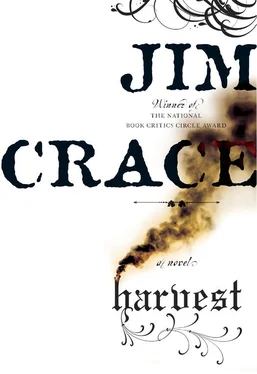This is my calculation, shaped once more without recourse to any constable or magistrate. Or any doctor, priest or undertaker, come to that. Yes, it’s just as well — again — that we are so far from civil practice, because a constable or magistrate would have the will and power to lay bare the causes of this man’s loose head and disfigured limbs. Here’s what took place. Sometime between my sodden visit to the pillory last night and Master Kent’s encounter with the two punished men this morning, when the younger was so manically uncivil, the elder man slipped or toppled from his stretched toes and snapped his neck. It might have been the rain that made him fall. Let’s hope his accident was sudden and he was sleeping. Or, God forbid, it could have been his living efforts to fight off a hungry hog that made him flail his body to and fro until his bones were split. Of course, it might have been a stopping heart. I hope it was a stopping heart. Or something unexceptional. Whatever happened, it is clear that the father did not fail to lift his head for Master Kent this morning as an insolent rebuke but because he was already dead.
I’m not the only one who will blame himself, and will have good cause to blame himself. As soon as we established the body on the porch bench this afternoon and were standing back, shamed and bloodied by our efforts and not daring yet to turn and face the mounted visitors, I saw the looks on Master Kent’s and Mr. Quill’s faces. A player in the theater could not devise a greater exhibition of guilt. And once the word has spread, there will be many villagers who will regret their scythes and sticks of yesterday morning and others who will run out to their sties with fingers knotted for good luck to see if any of their pigs has broken free or already seems too satisfied by the taste of foot and calf to want its customary peels or brewing mash. And if the Derby twins and Brooker Higgs have any tenderness for strangers — a subject open to debate, I know — they will surely want to hurry naked to the woods to flay themselves with whips. This is a death that touches all of us, though we still do not even know the fellow’s name.
But for the moment we are required — and thankful — to be hospitable. The four gentlemen by birth — that’s Mr. Quill, Master Kent, his cousin and the steward — are first ushered into what passes nowadays as the parlor to the manor house. The three sidemen take care of luggage and panniers. I am assigned, as any common servant, to lead the way with Willowjack and show Master Jordan’s groom where in the absence of a stable block their horses might be stalled. By the time I return, both chastened and annoyed by the groom’s presumption and disdain — how does the solemn custody of saddles make a man superior? — the gentlemen have disappeared into the upper rooms. I can hear the hum and mutter of their voices, and once or twice I recognize enough to know that the master is giving an account of what has happened at the pillory and his cousin is expressing his dismay that what was evidently once a fine manor house has ended up “as shabby and as threadbare as a beggar’s sack.”
I hope to overhear the better. I remove my shoes so that I might move quietly through the rooms. I know that I am not expected to join the gentlemen. I should not offer any words of my own. Master Jordan will have recognized my station from the clothes I wear, especially my rye-straw hat, and from the ripened color of my hands and cheeks. But I am determined to be the spy, though whether I am spying for myself or for my neighbors or for the master himself is not yet clear to me. Hearing them might make it so.
I see the inside of the house with a stranger’s eyes, for once. Certainly, the manor is not a place to make us cottage-dwellers jealous. We have no need of windows, or an upper floor. All we require for our estate is earth for carpeting, rubble-walls, and a pair of hearty crossbeam timbers to keep the roof from falling in. But people of a finer pedigree want cosseting. We have heard reports of prodigy houses in other country villages, where gentlemen and ladies take their rest in timbered beds as sturdy as galleons and closed off from the great glass window light by curtains and softened with flock mattresses. They sleep in fine linen or silky camlet sheets with spaniels at their feet, while in the many chambers of the house the servants rise at dawn to put a shine on tile floors, buff up chairs with cushioned arms, shake out the moths and motes from the painted hangings, the tapestries and Turkey work, and put out breakfast trays of dainties — the suckets, comfits, carroways we’ll never get the chance to taste. I’ve heard of yeoman palaces with lakes and deer parks in their grounds and so rich inside that a hungry mastiff is deployed all day to guard a cupboard where the mistress hides her costly silverware and brass and a casket full of jewelry. Indeed, when I was young and not yet come to this far place, I served Master Kent in a stone-built, courtyard residence with peacocks in a walled garden, a castellated tower, more than forty rooms and just as many helping hands whose only task was keeping house.
Master Kent’s home has no such finery and so no need of any mastiffs, or even any spaniels. If there is any luxury or opulence, it has been well concealed, or it has been untended. The manor was busier and more cared for when Lucy Kent was alive. Its rooms were used and always sweet with juniper smoke or strews of lavender. Some of our wives attended her each day, to help her dress and keep it clean and be her kitchen maids. But with her passing, her widower has preferred to simplify his life. The ancient gallery has been closed until this afternoon, as have all the sleeping rooms upstairs. Their fine wood paneling has begun to fade and scab for want of polishing. Mr. Quill is quartered comfortably enough, downstairs, in what was, in the elder Edmund Jordan’s day, the steward’s room and where more lately Lucy Kent would sit and close the day with her needle; and Master Kent makes do in the parlor, his retreat, with its open fire. He has a wainscot bed, set against the wall but uncurtained and without evidence of any flock or linen. He sleeps on a mattress stuffed with chaff like everybody else and his summer coverlets are hap-harlots, the coarsest cloth. He has a coffer full of documents and manuscripts, an oaken trestle table where he sits to eat alone and rest his candle, a high-backed settle to protect him from the draughts and two reminders of his wife: her smallest loom, her hairbrush. He has more space, more possibilities, than us, but who can say he has more comfort? I would not swap accommodations with him, to tell the truth. Nor would I want to swap my life with his. Not now.
It is the first time for many years — since I had quarters in the attic and in the turret room, in fact — that I’ve had reason to pause and study the grander, second story of the house. I have forgotten how melancholy these great rooms can be, especially when there are no dogs or children to misuse them. I am almost blinded by the dark as I draw close to the quartet of voices. It is still a bright afternoon outside. I have had to squint for much of the day. But even when my eyes grow used to it, the manor’s lack of light is burdensome. The building is too old for the great wide-latticed windows and oriels of newer dwellings. It does not have a square of window glass but only recessed openings and loopholes. What light it has is blanketed by the red-black canopy of beeches planted closely to the house, as was the custom, to protect against lightning strikes. But at least the darkness affords me some disguise. I am able to ascend the stairs, skirting round what few narrow shafts of light there are, until I reach the landing at the upper gallery and what remains of the master’s better furniture and brass-braced storage chests. And I can stay in shadow behind the curtain at the door to watch and hear the conversations at the far end of the room.
Читать дальше












